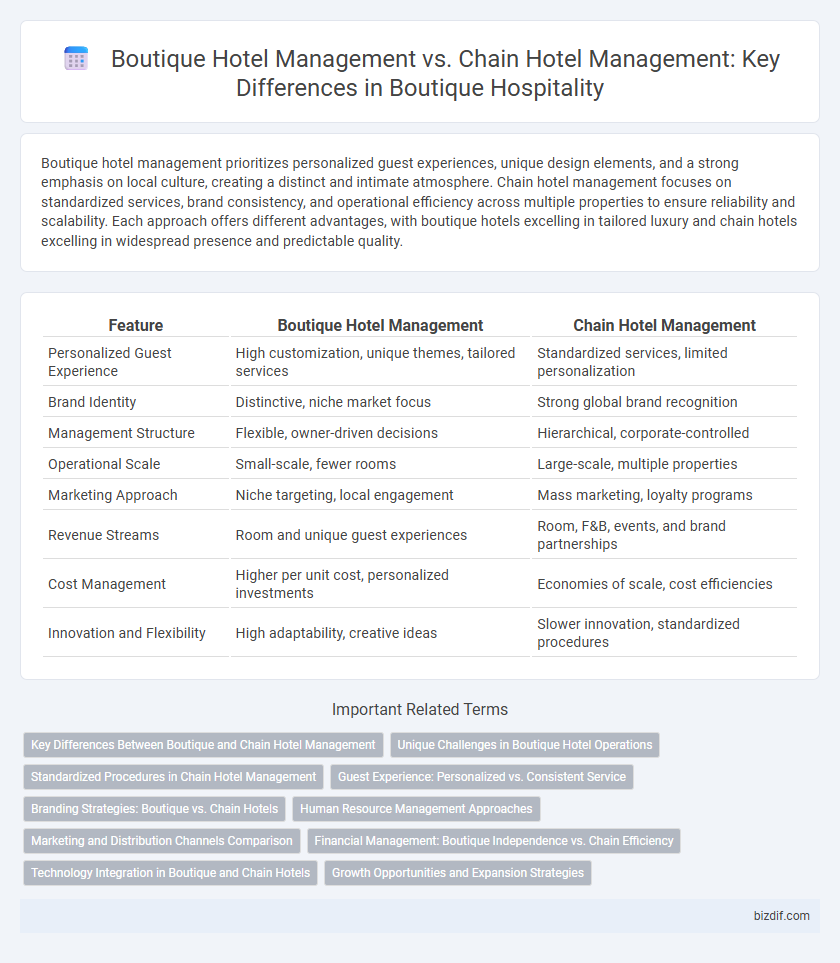Boutique hotel management prioritizes personalized guest experiences, unique design elements, and a strong emphasis on local culture, creating a distinct and intimate atmosphere. Chain hotel management focuses on standardized services, brand consistency, and operational efficiency across multiple properties to ensure reliability and scalability. Each approach offers different advantages, with boutique hotels excelling in tailored luxury and chain hotels excelling in widespread presence and predictable quality.
Table of Comparison
| Feature | Boutique Hotel Management | Chain Hotel Management |
|---|---|---|
| Personalized Guest Experience | High customization, unique themes, tailored services | Standardized services, limited personalization |
| Brand Identity | Distinctive, niche market focus | Strong global brand recognition |
| Management Structure | Flexible, owner-driven decisions | Hierarchical, corporate-controlled |
| Operational Scale | Small-scale, fewer rooms | Large-scale, multiple properties |
| Marketing Approach | Niche targeting, local engagement | Mass marketing, loyalty programs |
| Revenue Streams | Room and unique guest experiences | Room, F&B, events, and brand partnerships |
| Cost Management | Higher per unit cost, personalized investments | Economies of scale, cost efficiencies |
| Innovation and Flexibility | High adaptability, creative ideas | Slower innovation, standardized procedures |
Key Differences Between Boutique and Chain Hotel Management
Boutique hotel management prioritizes personalized guest experiences, intimate settings, and unique design elements tailored to specific locations, contrasting with chain hotel management's standardized operations and brand consistency across multiple properties. Boutique hotels often feature flexible staffing and specialized services to cater to niche markets, while chain hotels leverage economies of scale, centralized reservation systems, and uniform training protocols for operational efficiency. The key operational difference lies in boutique management's agility in local market adaptation versus chain management's focus on replicable business models and brand uniformity.
Unique Challenges in Boutique Hotel Operations
Boutique hotel management faces unique challenges such as personalized guest experiences, maintaining a distinctive brand identity, and managing limited resources compared to chain hotel management. Boutique hotels require highly tailored marketing strategies and staff training to foster intimate atmospheres and local cultural integration. Operational scalability is restricted, demanding innovative solutions in inventory, guest services, and technology implementation to sustain profitability and growth.
Standardized Procedures in Chain Hotel Management
Standardized procedures in chain hotel management ensure consistent service quality across multiple locations, enhancing brand reliability and guest satisfaction. These protocols streamline operations, reduce training time, and enable efficient resource management through uniform guidelines for housekeeping, front desk, and maintenance services. While boutique hotels emphasize personalized experiences, chain hotels leverage standardization to maintain operational efficiency and scalable growth.
Guest Experience: Personalized vs. Consistent Service
Boutique hotel management emphasizes personalized guest experiences by tailoring services to individual preferences, creating unique and memorable stays. Chain hotel management prioritizes consistent service standards across locations, ensuring reliability and familiarity for guests. This contrast highlights boutique hotels' adaptability versus chain hotels' uniform quality in guest satisfaction.
Branding Strategies: Boutique vs. Chain Hotels
Boutique hotel management emphasizes unique, locally inspired branding strategies that create personalized guest experiences and foster strong emotional connections. Chain hotel management focuses on standardized branding, leveraging global recognition and consistent service quality to attract a broad market base. Boutique hotels capitalize on niche marketing and authentic storytelling, while chain hotels benefit from economies of scale and loyalty programs to enhance brand visibility.
Human Resource Management Approaches
Boutique hotel management emphasizes personalized human resource strategies, fostering employee creativity and individualized guest service to maintain unique brand identity. Chain hotel management relies on standardized HR practices, utilizing centralized training programs and uniform performance metrics to ensure operational consistency across multiple locations. Employee engagement in boutique hotels often involves flexible roles and direct communication, contrasting with the structured hierarchy and protocol adherence found in chain hotel HR systems.
Marketing and Distribution Channels Comparison
Boutique hotel management emphasizes personalized marketing strategies targeting niche markets through direct channels such as social media, local partnerships, and independent booking platforms, enhancing brand uniqueness and guest loyalty. Chain hotel management relies heavily on centralized distribution channels, including global reservation systems, major online travel agencies (OTAs), and loyalty programs, maximizing reach and volume across diverse demographics. The contrast highlights boutique hotels' focus on curated guest experiences through specialized marketing, while chain hotels prioritize broad market penetration and standardized distribution efficiency.
Financial Management: Boutique Independence vs. Chain Efficiency
Boutique hotel management emphasizes financial independence, allowing personalized budgeting and nimble allocation of resources tailored to unique guest experiences, often resulting in higher profit margins per room. Chain hotel management leverages economies of scale and standardized financial controls, optimizing cost-efficiency across multiple properties through centralized purchasing and uniform financial reporting systems. The contrast centers on boutique hotels prioritizing customized financial strategies versus chain hotels focusing on streamlined, large-scale financial efficiency.
Technology Integration in Boutique and Chain Hotels
Boutique hotel management often leverages advanced technology integration to provide personalized guest experiences through customized apps, smart room controls, and tailored digital concierge services, enhancing the intimate and unique atmosphere. Chain hotel management focuses on scalable technology solutions such as centralized booking systems, standardized CRM platforms, and automated revenue management tools to maintain consistency and operational efficiency across multiple locations. Both models adopt IoT devices and AI-powered analytics, but boutique hotels prioritize guest-centric innovations, whereas chain hotels emphasize system-wide optimization.
Growth Opportunities and Expansion Strategies
Boutique hotel management emphasizes personalized guest experiences and niche market targeting, fostering organic growth through unique branding and localized marketing strategies. Chain hotel management leverages standardized operational systems and extensive capital resources, enabling rapid expansion via franchising and global market penetration. Growth opportunities in boutique hotels often center on exclusive service differentiation, while chain hotels pursue scalability and market dominance through uniformity and widespread presence.
Boutique hotel management vs Chain hotel management Infographic

 bizdif.com
bizdif.com